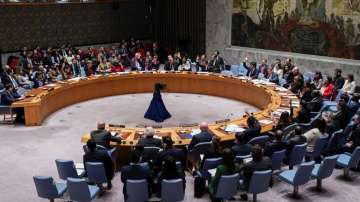Israel-Hamas war: UNSC adopts watered-down resolution to boost humanitarian aid in Gaza, US abstains
The resolution came amid global outrage over the rising death count of Palestinians in the Gaza Strip, which has already crossed 20,000, and a worsening humanitarian crisis. The US and Israel oppose a ceasefire, believing it would only benefit Hamas.

The UN Security Council on Friday adopted a watered-down resolution to increase humanitarian aid to war-torn Gaza, but stopped short of calling for a ceasefire after several days of delays and intense negotiations to avoid a veto by the United States. At least 13 out of the 15-member council voted in favour of the resolution, with the US and Russia abstaining.
The resolution "calls for urgent steps to immediately allow safe, unhindered, and expanded humanitarian access and to create the conditions for a sustainable cessation of hostilities". The resolution came amid global outrage over the rising death count of Palestinians in the Gaza Strip, which has already crossed 20,000, and a worsening humanitarian crisis.
The Israeli military has expressed regret for civilian deaths but blamed Iran-backed Hamas for operating in densely populated areas or using civilians as human shields. The US and Israel oppose a ceasefire, believing it would only benefit Hamas. However, Washington has supported pauses in fighting to protect civilians and free hostages taken by Hamas.
Following high-level negotiations to win over Washington, the resolution no longer dilutes Israel's control over all aid deliveries to 2.3 million people in Gaza. Israel monitors the limited aid deliveries to Gaza via the Rafah crossing from Egypt and the Israeli-controlled Kerem Shalom crossing.
Tough negotiations
However, Russia, along with countries from Arab and Organisation of Islamic Cooperation (OIC) have expressed frustration with the changing language of the text on cessation of hostilities, as some countries view it as an approval for Israel to further act against Hamas. Russia proposed the draft be amended to revert to the initial text calling for "an urgent and sustainable cessation of hostilities, but the amendment was vetoed by the US.
US Ambassador to the UN Linda Thomas-Greenfield described the resolution as "a glimmer of hope amongst a sea of unimaginable suffering," noting that it was the first time the council had referenced a cessation of hostilities. "We know so much, so much more needs to be done to address this humanitarian crisis and to lay the groundwork for a lasting peace," she said.
However, she lamented that the resolution does not denounce the deadly Hamas attack on October 7. “Ultimately, while we are encouraged that the council spoke out on this humanitarian crisis we’re deeply disappointed — appalled, actually — that once again, the council was not able to condemn Hamas for the horrific terrorist attack [it perpetrated] on October 7,” Thomas-Greenfield said.
Israel’s Ambassador to the UN, Gilad Erdan, thanked the US for its support and sharply criticized the UN for its failure to condemn Hamas’ October 7 attacks. The US previously vetoed a resolution in October that would have included a condemnation because it didn’t also underline Israel’s right to self-defense.
Earlier this month, the 193-member UN General Assembly demanded a humanitarian ceasefire, with 153 states voting in favor of the move that had been vetoed by the United States in the Security Council days earlier. The resolution, sponsored among others by Algeria, Bahrain, Iraq, Kuwait, Oman, Qatar, Saudi Arabia, United Arab Emirates and Palestine, demanded an immediate humanitarian ceasefire in Gaza and reiterated its demand that all parties comply with their obligations under international law, “notably with regard to the protection of civilians."
Situation in Gaza
Israel’s aerial and ground offensive has been one of the most devastating military campaigns in recent history, displacing nearly 85% of Gaza’s 2.3 million people and leveling wide swaths of the tiny coastal enclave. More than half a million people in Gaza — a quarter of the population — are starving, according to a recent UN report.
Israel, shielded by the US, has resisted international pressure to scale back its offensive. The military has said that months of fighting lie ahead in southern Gaza, an area packed with the vast majority of the enclave’s 2.3 million people, many of whom were ordered to flee combat in the north earlier in the war.
Israel’s military says 139 of its soldiers have been killed in the ground offensive. It says it has killed thousands of Hamas militants, including about 2,000 in the past three weeks, but it has not presented any evidence to back up the claim.
(with inputs from Reuters, AP)
ALSO READ | Israel-Hamas War: No functioning hospitals left in northern Gaza, says WHO amid truce talks